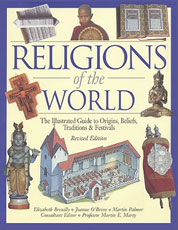"Hinduism is the religion followed by more than 650 million people in India and 100 million in the rest of the world, and it encompasses a huge variety of beliefs and rituals. Over the centuries this religious tradition has slowly evolved to be practiced and understood in many different ways, but it is intricately woven into the land and culture of India. Although religious beliefs may vary, they are not exclusive of one another and are accepted by Hindus as part of the wide body of Hindu tradition.
" 'Hinduism' is not the name that the people of India gave to this spiritual tradition, but was a name given later by outsiders to describe the people who lived east of the river Indus. Hinduism came to be the term used by foreigners to describe the religion of India, although Hindus refer to their religion as sanatana dharma, the 'eternal truth' or 'ancient religion.' The word dharma is rich in meaning: it can refer to the natural, unchanging laws that sustain the universe and keep it in balance, or it can be translated as 'law' or 'social duty.'
"In the Hindu holy books there are traditional laws and duties that have been handed down from generation to generation. For Hindus it is a religious responsibility to carry out the duties that are associated with each stage of life and with the family and part of society into which they are born. These include the duties of a mother to her children, of a son to his father, of a teacher to his students, and other spiritual and devotional duties. Members of families and communities also carry a responsibility to participate in important rites of passage such as birth, marriage and death. For many Hindus, secular and religious life are not separate, since faith plays a vibrant part in everyday life."
